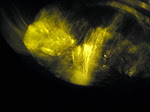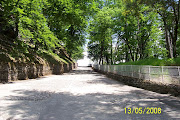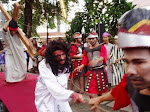
"The Road That Leads There Is the Journey of Every Christian"
VATICAN CITY, APRIL 6, 2008 (Zenit.org).- Here is a translation of the greeting Benedict XVI gave today before praying the Regina Caeli with several thousand people gathered in St. Peter's Square.
* * *
Dear Brothers and Sisters,
This Gospel for this Sunday -- the 3rd Sunday of Easter -- is the celebrated account of the disciples of Emmaus (cf. Luke 24:13-35). The story is told of two disciples of Christ who, on the day after the Sabbath, that is, the third day after Jesus’ death, sad and dejected, leave Jerusalem and set out for nearby village called, precisely, Emmaus.
Along the road, the risen Jesus comes and walks beside them but they do not recognize him. Seeing that they were disheartened, he explained, on the basis of the Scriptures, that the Messiah had to suffer and die to enter into his glory. Having entered into the house with them, he sat down at table with them, blessed the bread and broke it, and at that point they recognized him, but he disappeared from their sight, leaving them full of wonder before the broken bread, new sign of his presence. And immediately the two returned to Jerusalem and told the other disciples what happened.
The location of Emmaus has not been identified with any certainty. There are different hypotheses, and this fact is not without its significance because it leaves us to think that in reality Emmaus represents every place: The road that leads there is the journey of every Christian, indeed, of every man. Along our roads the risen Jesus is our companion on the journey, to reignite in our hearts the warmth of faith and hope and the breaking of the bread of eternal life.
In the disciples' conversation with the unknown traveler the expression that the evangelist Luke puts in one of their mouths is striking: “We were hoping…” (24:21). This past tense verb says everything: We believed, we followed, we hoped …, but now it is all over. Even Jesus of Nazareth, who had shown himself to be a powerful prophet in deeds and words, failed, and we are disappointed.
This drama of the disciples of Emmaus is as a mirror of the situation of many Christians of our time. It seems that the hope of faith has failed. Faith itself enters into crisis because of negative experiences that make us feel like we are abandoned by the Lord. But this road to Emmaus on which we travel can become a way of purification and maturation of our believing in God.
Even today we can enter into conversation with Jesus listening to his word. Even today he breaks the bread for us and gives himself as our bread. And in this way the encounter with the risen Christ, which is possible even today, gives us a deeper and more authentic faith, tempered, so to speak, by the fire of the Easter event; a robust faith because it is nourished not by human ideas, but by the word of God and by his presence in the Eucharist.
This stupendous Gospel text already contains the structure of the Mass: in the first part the hearing of the word through the sacred Scriptures; in the second the Eucharistic liturgy and communion with Christ present in the sacrament of his Body and his Blood.
Nourished at this twofold table, the Church is unceasingly built up and renews itself day by day in faith, in hope and in charity. Through the intercession of Mary Most Holy, let us pray that every Christian and every community, reliving the experience of the disciples of Emmaus, rediscover the grace of the transforming encounter with the risen Lord.
[After the Regina Caeli the Pope said the following in Italian:]
The first International Congress on Divine Mercy concluded today with the Eucharistic celebration in St. Peter’s Basilica. I thank the organizers, especially the vicariate of Rome, and to all the participants I extend my cordial greeting, which now becomes an exhortation: Go and be witnesses of God’s mercy, source of hope for every man and for the whole world. May the risen Lord be with you always!
I greet the numerous members of the Focolare movement, working as catechists in parishes, who have come here from many countries throughout the world, and I wish you well in the service that you render to spreading and welcoming the word of God.
[Translation by Joseph G. Trabbic]
[After the Regina Caeli the Holy Father greeted the pilgrims in several languages. In English, he said:]
I am happy to greet all the English-speaking visitors present at today’s Regina Caeli prayer. On this Third Sunday of Easter, Saint Luke relates how the Risen Christ walks with his disciples, makes their hearts burn within them by his words, and reveals himself in the breaking of the bread. Let us pray that our Easter journey will teach us to open our hearts with joy to the living Christ present in his Church. Upon all of you I invoke God’s abundant blessings!


















.jpg)

No comments:
Post a Comment